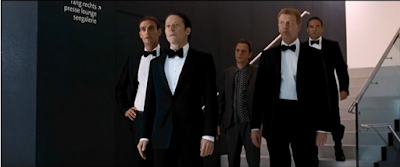Watch the trailer, you will have a better time than if you watch the whole movie. This unnecessary remake makes two important changes from the original. First, the extreme sports pictured are not limited to following the perfect wave around the world. Second, they jettison any charisma that the stars had in the original production. Both are bad choices.
Let's start with the two stars of the film. Oh, I said stars didn't I, sorry, the two lead actors in this picture because at this point, they sure as hell ain't stars. Neither the good guy, nor the bad, can hold the screen. Fortunately for the director, who was also the cinematographer, there are a lot of scenic vistas and rivers and oceans to take the focus of the film goer. The guys have no ability to sell a line, and if you thought Keanu Reeves line readings were unintentionally hilarious in the original, be prepared to discover that he was at least trying to act.
The extreme sports are shot nicely, but you can see a lot of the same kind of footage on YouTube, done with a GoPro camera, and then you can skip the pseudo-intellectual philosophy of Bohdi and Utah. It's as if "Occupy Wall Street" was taken over by Morpheus from "the Matrix", and it is really not about economic inequality but saving the planet. I can't begin to describe some of the stupidity that is trying to pass itself off as profundity here. When the girl in the story, wearing the kind of garb you might expect to see at a commune, explains that the eco-warrior who created the extreme sports metaphysics that are being pursued by the gang, was killed trying to put himself between a whaling boat and it's prey, I almost burst my gut in laughter. It was funnier than anything said in the Tarantino film from yesterday. This dialogue is jaw-dropping bad.
 The original film is notorious for being a "good" bad film. It is enjoyable hooey that is sparked up by Patrick Swayze and Keeanu Reeves and is propelled by action director Kathryn Bigelow. It was stupid, but fun stupid and it knew that it was just a piece of entertainment. This version seems to have higher aspirations and lower ability to reach them. I saw fewer movies this year than usual, but I was more selective and saw fewer turkeys. This one fills my quota of crap for the year. I did not expect much, and I got even less. The one pleasure that the film affords me is that it provides a target for me to mock for a few days.
The original film is notorious for being a "good" bad film. It is enjoyable hooey that is sparked up by Patrick Swayze and Keeanu Reeves and is propelled by action director Kathryn Bigelow. It was stupid, but fun stupid and it knew that it was just a piece of entertainment. This version seems to have higher aspirations and lower ability to reach them. I saw fewer movies this year than usual, but I was more selective and saw fewer turkeys. This one fills my quota of crap for the year. I did not expect much, and I got even less. The one pleasure that the film affords me is that it provides a target for me to mock for a few days.Let me finish by giving you one quick example so you can mock the movie without seeing it. In the original, Johnny Utah catches Bohdi on the beach at the end and lets him paddle out to meet his fate. It was corny but almost plausible in a physical sense. Here, Utah descends from a helicopter, onto a small boat in the middle of the ocean, while a storm the likes of which would have done justice to George Clooney and Mark Walberg. There he has a seventy-five second conversation before zipping back up to the sky. That's right, the F.B.I agent basically uses a huge amount of resources, and risks the life of his pilot and others on the chopper, to deliver a cliche. DUMB!!!













































